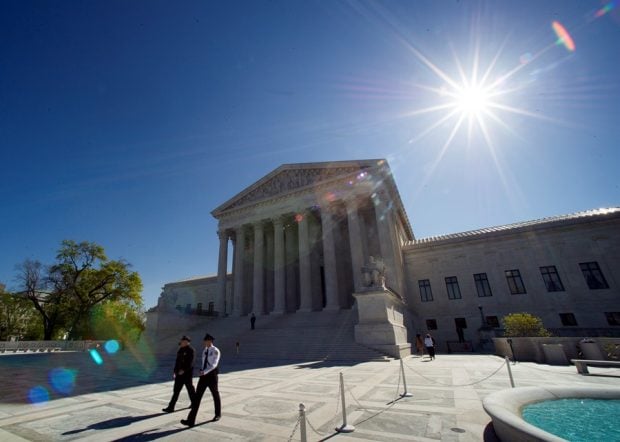 Thejustices,ruling in a securitiescase,said the 1974 decision in American Pipe & Constructionv. Utah suspends the statute of limitations while a putativeclass action is pending, which allows unnamedclass members to join individually or to file separate claims ifthe class fails. “But American Pipe does not permit themaintenance of a follow-on class action past expiration of thestatute of limitations,” wrote Justice Ruth Bader Ginsburg for thecourt in China Agritech v. Resh.
Thejustices,ruling in a securitiescase,said the 1974 decision in American Pipe & Constructionv. Utah suspends the statute of limitations while a putativeclass action is pending, which allows unnamedclass members to join individually or to file separate claims ifthe class fails. “But American Pipe does not permit themaintenance of a follow-on class action past expiration of thestatute of limitations,” wrote Justice Ruth Bader Ginsburg for thecourt in China Agritech v. Resh.
 Ruth Bader Ginsburg
Ruth Bader GinsburgBoth the Private SecuritiesLitigation Reform Act, which governed the litigation before thecourt, and Federal Rule of Civil Procedure 23, which applies tononsecurities class actions, “evince a preference” for barringuntimely successive class actions by emphasizing early resolutionof class certification and class representation, Ginsburgwrote.The case before thecourt, the third class action brought on behalf of purchasers ofChina Agritech's common stock, alleged violations of the SecuritiesExchange Act of 1934. The law has a two-year statute of limitationsthat begins to run when facts constituting the violation arediscovered.A federal districtcourt had denied class certification to two earlier successiveclass actions that made materially identical allegations againstChina Agritech for fraud and misleading business practices. MichaelResh, who had not sought lead plaintiff status in those earlierclass actions, filed suit in 2014, a year and a half after thestatute of limitations had expired.The U.S. Court of Appeals for the Ninth CircuitinMay 2017 reversedthe district court's dismissal of Resh's suit asuntimely. The circuit courts had divided over whether AmericanPipe could, as the Ninth Circuit concluded, save otherwiseuntimely successive class claims.Ginsburg said nothing in America Pipeor the court's decisions applying it “so much as hints” thattolling extends to otherwise time-barred claims.“We hold that American Pipe does notpermit a plaintiff who waits out the statute of limitations topiggyback on an earlier, timely filed class action,” Ginsburgwrote. “The 'efficiency and economy of litigation' that supporttolling of individual claims do not support maintenance of untimelysuccessive class actions; any additional class filings should bemade early on, soon after the commencement of the first actionseeking class certification.”Locke Lord partner Rusty Perdew in Chicagosaid the decision takes a “practical and realistic approach” andgives class defendants an important victory. The Ninth Circuit'sdecision, he said, “would have permitted plaintiffs to indefinitelyextend statutes of limitations and relitigate class certificationby filing successive class actions after class certification wasdenied.”However, Noelle Reed,a partner at Skadden, Arps, Slate, Meagher &Flom, cautioned that thedecision, along with the court's 2017 decision in CaliforniaPublic Employees' Retirement System v. ANZ Securities, “mayspur plaintiffs to file multiple 'protective' classactions—possibly in competing courts—to avoid having their classclaims time-barred if they are not able to obtain classcertification before limitations or repose periodsexpire.”Justice SoniaSotomayor concurred in the court's judgment, explaining that sheagreed with the court's decision as it applied to class actionsunder the Private Securities Litigation Reform Act of 1995, but notas to class actions not subject to that act.Sotomayor said there are important differencesbetween classes governed by the 1995 act and classes subject toRule 23.“The majority'sconclusion that absent class members were not diligent because theyfailed to ask to be the class representative in a prior suit makessense only in the PSLRA context,” she wrote. “The same conclusionsimply does not follow in the generic Rule 23 context, where absentclass members are most likely unaware of the existence of aputative class action.”ChinaAgritech's counsel, Seth Aronson, partner atO'Melveny &Myers,hadarguedthat the Ninth Circuit's rule "impermissiblyextends equitable tolling when the plaintiffs have not exerciseddiligence." Those absent class members, he said, could have soughtto protect their rights through individual actions when the classfailed. Instead, they "slept on their rights and are thus notentitled to equity."Resh'scounsel, David Frederick of Kellogg, Hansen, Todd, Figel &Frederick, hadcounteredthat a timely class action suspends thelimitations as to all asserted class members and "puts defendantson fair notice of potential liability in a subsequent class actionasserting similar claims."TheU.S. Chamber of Commerce, the Washington Legal Foundation andothers supported China Agritech in amicus briefs. Resh drewsupporting briefs from a group of plaintiffs in post-Walmartsuccessor class actions, Public Citizen, AARP and a group ofretired federal judges, among others.BenefitsPROrelated reading:Top 10 ERISA class-action settlements in2017Employers can bar workers class-action lawsuits,Supreme Court rulesSCOTUS ruling not expected to affect FINRA banon class-action waivers
Complete your profile to continue reading and get FREE access to BenefitsPRO, part of your ALM digital membership.
Your access to unlimited BenefitsPRO content isn’t changing.
Once you are an ALM digital member, you’ll receive:
- Critical BenefitsPRO information including cutting edge post-reform success strategies, access to educational webcasts and videos, resources from industry leaders, and informative Newsletters.
- Exclusive discounts on ALM, BenefitsPRO magazine and BenefitsPRO.com events
- Access to other award-winning ALM websites including ThinkAdvisor.com and Law.com
Already have an account? Sign In
© 2024 ALM Global, LLC, All Rights Reserved. Request academic re-use from www.copyright.com. All other uses, submit a request to [email protected]. For more information visit Asset & Logo Licensing.








